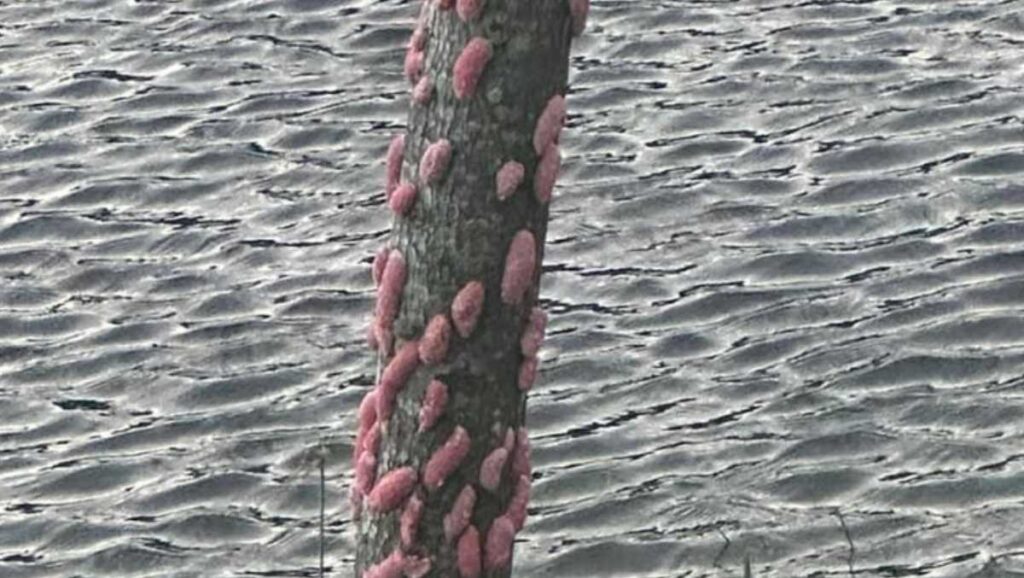Just in time for Halloween, strange pink blobs are appearing on trees and seawalls in southwest Cape Coral. “I think it’s like cotton candy,” said Ryan Klott, who noticed a vibrant cluster appearing in his apartment complex off Chiquita Boulevard after the severe weather. “We don’t really know what they are, what they do, or where they come from.” Neighbors who live near the Freshwater Canal also say these bubblegum-like things are on their docks. They have been noticed stuck to stakes in the water or in the grass near water. “They’re creepy,” said Karen Fulton, another Southwestern Cape resident. “I just want to know if it’s dangerous for my dog in case he wants to go sniff or something,” Klott said. If you could guess that these strange pink invaders are the eggs of the invasive island apple snail, you would be right. That’s right! These eggs can irritate the eyes and skin if they come into contact with them, explains Dr. Cristina Anaya, an FGCU assistant professor who specializes in parasites. Additionally, snails themselves can carry harmful parasites. “Apple snails, like many other types of snails, can carry a parasite called rat lungworm,” Anaya says. “You don’t want to feed it to your pets. If you find it in your garden, you want to avoid that fruit or vegetable. Their mucus can harbor parasites.” People can scrape the eggs off surfaces. The FWC says there is currently no practical way to remove eggs and snails from a large area, although attempts may be made to destroy the clumps. Just like villains in science fiction movies, they tend to come back. “They lay eggs so small that they can lay large collections of up to 2,000 eggs in one of those small clusters,” Anaya said. “So it’s not unusual to have so many individuals, but their ability to become sexually mature and lay so many eggs allows them to reproduce in their environment. The good news is: Snails and their eggs have natural enemies. Experts say these make a great snack for birds and alligators. As you enjoy the Halloween season, be on the lookout for these strange pink invaders and stay informed about their potential impact on the environment and your pets.
CAPE CORAL, FL —
Just in time for Halloween, strange pink blobs are appearing on trees and seawalls in southwest Cape Coral.
“I think it’s like cotton candy,” said Ryan Klott, who noticed a vibrant cluster appearing in his apartment complex off Chiquita Boulevard after the severe weather. “I have no idea who they are, what they do, or where they come from.”
Neighbors who live near freshwater canals have also noticed these bubblegum-like substances stuck to dock pilings and in grass near water.
“They’re creepy,” said Karen Fulton, another Southwestern Cape resident.
“I just want to know if it’s dangerous for my dog in case he wants to sniff it,” Klott said.
If you guessed that these strange pink invaders were the eggs of the invasive island apple snail, you’d be right. These eggs can irritate the eyes and skin if they come into contact with them, explains Dr. Cristina Anaya, an FGCU assistant professor who specializes in parasites. Additionally, snails themselves can carry harmful parasites.
“Apple snails, like many other types of snails, can carry a parasite called rat lungworm,” Anaya says. “You don’t want your pet to eat them. If you find them in your garden, you’ll want to avoid those fruits and vegetables. Their mucus may contain parasites.”
People are trying to scrape the eggs off surfaces and break up the clumps, but the FWC says there is currently no practical way to remove eggs and snails from large areas. Like villains in sci-fi movies, they tend to keep coming back.
“They lay eggs so small that they can lay large egg collections of up to 2,000 eggs in one of those small clusters,” Anaya said. “So it’s not unusual to have so many individuals, but their ability to become sexually mature and lay so many eggs allows them to reproduce in their environment. They can compete with our native species.”
The good news is that snails and their eggs have natural enemies. Experts say it’s a great snack for birds and alligators.
As you enjoy the Halloween season, be on the lookout for these strange pink invaders and stay informed about their potential effects on the environment and your pets.

